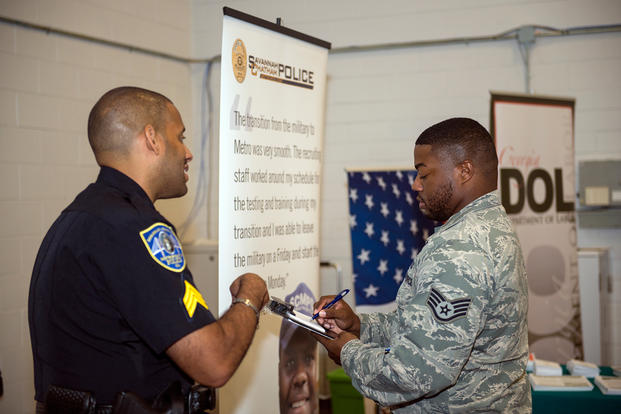Question: I've recently left the Air Force and have started networking professionals to find a civilian job. When meeting someone new, I tell them what I've done, what I'm looking for and the roadblocks I've encountered. And they look back at me with a blank stare. Or they try to give me advice that isn't helpful. What am I doing wrong?
Answer: One of the hardest aspects of the private business culture I teach transitioning service members is the concept of networking. Let's review some basics of networking in your civilian career:
1. Networking requires you to form rapport first.
Rapport is where both parties feel comfortable sharing information with each other. This takes time. It starts by introducing yourself, allowing them to introduce themselves and asking follow-on questions.
2. A strong elevator pitch allows you to introduce yourself with focus and confidence.
Think about sharing what you do (or want to do), why you care about that work and a quick example of the kind of work you're looking for. Your elevator pitch should be succinct, shared with a smile and understandable.
3. Be careful not to use too much military-speak.
Odds are, you're going to be meeting with civilians. (The numbers of those who've served, versus those who haven't, confirms this.) Avoid leading with your military occupational specialty (MOS) or using military terminology and acronyms. You'll only distance yourself from the person you're speaking to.
4. Show interest in the other person.
While it's tempting to want to tell your entire story to each new person you meet -- after all, maybe they can help connect you to a great job -- networking can't be one-sided. If you're doing all the talking, then you're not networking; you're selling.
5. Remember, just because someone doesn't want to talk to you doesn't mean it's personal.
Perhaps they're waiting to meet someone, or are distracted or otherwise preoccupied. When one conversation ends, move onto another one.
6. First impressions matter.
Are you introducing yourself with a smile and a firm handshake? Or do you appear dejected or desperate? People are typically attracted to people who appear confident and friendly, not those who seem needy or angry.
7. Consider the environment.
Are you at a social function, business meeting or professional event? Is networking expected, or would it be seen as inappropriate (e.g., you wouldn't network at a funeral). If you're at a social function and find yourself pitching your business idea, others could be turned off. Similarly, networking at a job fair is a great idea, since everyone attending is focused on career goals.
8. Body language accounts for a lot of the information that is communicated.
Be sure your eye contact shows respect and approachability; your handshake is firm and confident, but not aggressive; and your posture reflects self-assuredness.
9. Think about how you can help others.
It's normal, when networking in a job search, to be focused on what you need and what you want. But networking is as much about giving as it is about receiving. As you're talking to a new acquaintance, pay attention to ways you can help them -- as a resource, with information, by making introductions for them, etc. Even if you don't think there's much you can offer, there is.
10. Networking requires gratitude.
If your conversation is brief, thank the other person for their time and interest. If the discussion leads to a follow-up meeting, referral or something else of value, then you should also say thank you. And don't forget that a handwritten thank-you note is one of the best ways you can express gratitude and stay top-of-mind with your networking contacts.
I hope these tips help you see ways you can refine your networking to produce better results.
Lida Citroën is an international reputation management and branding specialist and CEO of LIDA360. Lida serves her corporate clients with personal branding, reputation management, online positioning and reputation repair strategies and implementation programs. Lida is passionate about helping our nation's veterans navigate the military-to-civilian career transition and is a popular speaker at military installations and events on veteran hiring. Her best-selling book, "Your Next Mission: A personal branding guide for the military-to-civilian transition," offers veterans the tools to move successfully to meaningful civilian careers.
Lida, a regular contributor for Military.com and Entrepreneur.com, is the recipient of numerous awards for her service to our veterans.
Keep Up with the Ins and Outs of Military Life
For the latest military news and tips on military family benefits and more, subscribe to Military.com and have the information you need delivered directly to your inbox.














